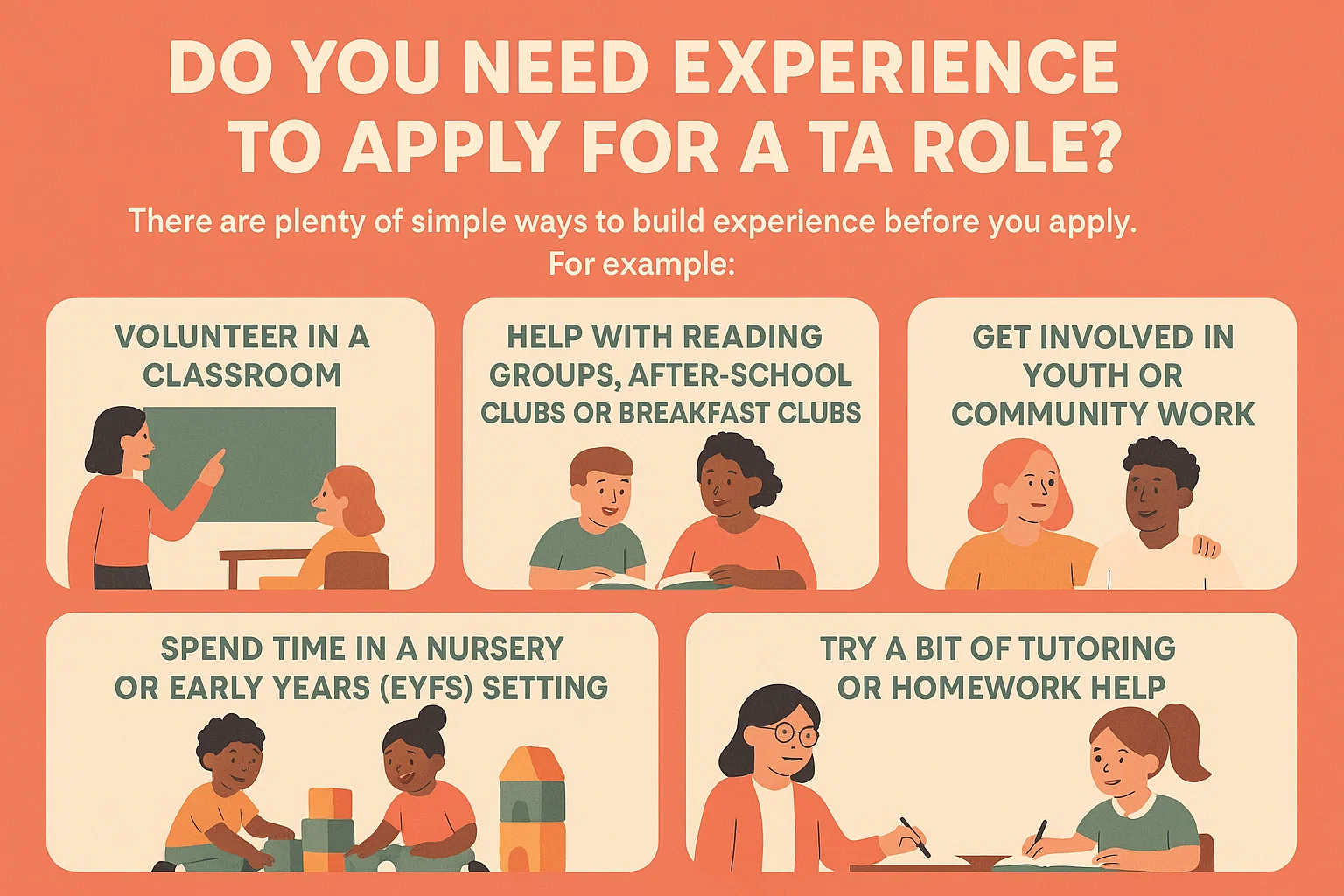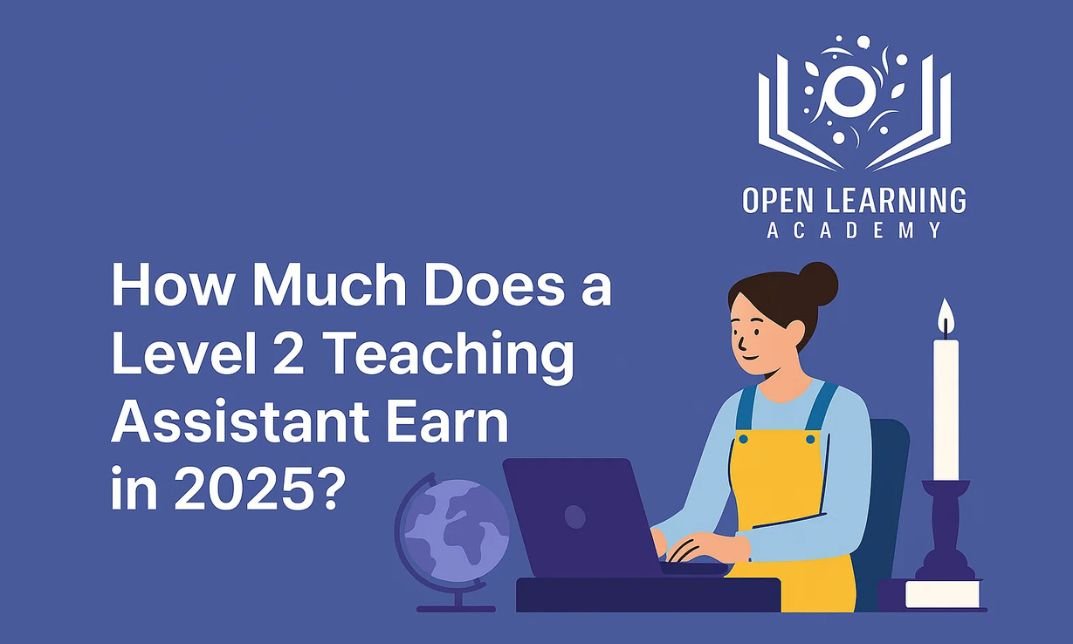No products in the cart.
Helping children learn and keeping the classroom calm can feel deeply rewarding. Teaching assistants make this possible every day. They support pupils, help teachers, and keep lessons running smoothly. If you’ve ever wondered, “How do you become a teaching assistant?”, this guide will show you the simple steps to start your journey.
This simple 2026 guide shows you exactly how to qualify, apply, and get hired in the UK — without any confusing details. You only need the basics: GCSE English and Maths (or Functional Skills), an enhanced DBS check with the children’s barred list (about £49.50 or £16 a year with the Update Service), your right-to-work ID, and a safeguarding induction once you start.
You’ll learn what qualifications you need, how to get experience, and what checks are required before you start. We’ll also explain how to find entry-level roles, what training helps you stand out, and how the hiring process works in 2026. By the end, you’ll have a clear, step-by-step picture of how to begin your journey as a teaching assistant — and the confidence to take your first step.
What Is a Teaching Assistant and What Do They Do?
A Teaching Assistant supports pupils’ learning and helps teachers keep lessons running smoothly every day. In simple terms, TAs are the extra helping hands in the classroom. Their day can include many different tasks, such as:
- Helping small groups or one-to-one with reading, phonics, or maths.
- Encouraging good behaviour and keeping pupils focused.
- Setting up classroom activities and resources.
- Taking quick notes or observations for the teacher.
- Supervising pupils during break or lunch times.
Most importantly, teaching assistants help children build confidence, feel included, and make steady progress in their learning.
What Qualifications Do You Need to Become a Teaching Assistant?
To begin your journey, most schools ask for GCSE English and Maths at grades 9–4 (C or above) or the Functional Skills equivalents. These show you have the key reading and number skills needed to support pupils.
If you want to improve your chances of getting hired, certain qualifications can really help:
- Level 2 Certificate in Supporting Teaching and Learning – a good entry course that covers classroom basics.
- Level 3 Teaching Assistant qualification – gives you more confidence and allows you to lead small-group activities.
- Safeguarding training – you’ll complete this in school, but a short basic course before starting looks great on your CV.
- SEN-focused CPD – short courses on autism, ADHD, communication, behaviour, or phonics make you stand out.
Each qualification helps you feel more prepared and shows employers your commitment to helping children learn and grow.
Once you gain experience, you can aim higher and become a Higher Level Teaching Assistant (HLTA). This step comes later and isn’t needed to start your TA career.
Do You Need Experience to Apply for a TA Role?

Good news — you can apply for a teaching assistant job even with little or no formal experience. What matters most is your attitude. If you’re caring, patient, and enjoy helping children learn, you already have a great start.
There are plenty of simple ways to build experience before you apply. For example:
- Volunteer in a classroom or join short observation days to see how lessons work.
- Help with reading groups, after-school clubs, or breakfast clubs to gain confidence.
- Spend time in a nursery or early years (EYFS) setting to learn how young children develop.
- Get involved in youth or community work where you support and guide young people.
- Try a bit of tutoring or homework help to build your teaching skills.
Each small thing you do helps you understand how schools work and how to support pupils.
While you help, write down what you did — who you helped, what jobs you did, and what you learned. Also, ask two people who saw your work to be your references. Even a little real experience can make a big difference. It shows schools that you care, that you’re ready to learn, and that you want to help children do well.
How Do You Apply for Teaching Assistant Jobs in the UK?
Looking for a teaching assistant job can feel exciting — and a bit scary — but it’s easier than you think. You just need to know where to start.
First, check local council job sites, Multi-Academy Trust (MAT) websites, and individual school pages. You can also look at national job boards and search for “teaching assistant” or “learning support assistant.”
When you find a job you like, make your CV simple and clear. Focus on what really matters:
- Any work or volunteering with children.
- Your GCSE or Functional Skills in English and Maths.
- Your DBS check (or write “DBS in progress” if waiting).
- A short note about safeguarding training or awareness.
- Your availability, like term-time or part-time hours.
Then, write a short, friendly cover letter. Say why you like the school, and how you’d help children learn and feel included. Keep it warm and honest — schools love to see your real passion.
Before sending your application, tick off this quick checklist:
- Your ID and right-to-work documents
- Copies of your certificates
- Two referees who can confirm your experience
Every application is a fresh chance to show your heart, skills, and care for children. Take that first step — your future classroom is waiting!
What Skills Do Schools Look for in a Teaching Assistant?
Schools want teaching assistants who are kind, calm, and ready to help children learn. You don’t need fancy skills — just care, patience, and a positive attitude.
Here are the main skills schools look for:
- Patience and kindness – stay calm and gentle when a child struggles with reading or maths.
- Good communication – speak clearly, listen carefully, and use a happy, friendly voice.
- Teamwork – work well with the teacher, follow their plans, and share what you notice about pupils.
- Good organisation – keep things tidy, prepare materials, and make sure lessons run on time.
- Basic computer skills – use email, the classroom whiteboard, or simple online tools.
- Reliability – come to work on time, be ready to help, and do what you say you will.
And most importantly, always think about safeguarding — keep private things secret and tell a teacher quickly if you’re worried about a child.
These simple skills show schools that you care, that you can be trusted, and that you’ll make the classroom a happier place for everyone.
How Long Does It Take to Become a Teaching Assistant?

Becoming a teaching assistant doesn’t take too long. In fact, you can start quite fast. It really depends on how you choose to learn and how much time you can give.
If you’re new, short online courses are the best way to begin. They only take a few weeks and teach you what the job is about in simple steps. Then, you can do a Level 2 course, which usually takes a few weeks to a couple of months. It helps you learn how to support teachers and pupils in the classroom.
A Level 3 Teaching Assistant course takes a bit more time — around 3 to 6 months. You’ll learn how to help pupils more closely and handle small group work. If you want to work and learn at the same time, go for a Teaching Assistant Apprenticeship. It takes about 12 to 18 months, and you’ll earn money while getting real school experience.
The good thing is, many schools hire beginners and help them train while they work. So, you can start helping pupils right away and learn new skills each day. With a bit of time, hard work, and kindness, you can soon become a confident teaching assistant who makes a real difference in the classroom.
How Much Do Teaching Assistants Earn in 2025?
If you’re thinking about pay, here’s a simple and clear guide. Teaching assistant pay depends on where you work and your level of experience.
Here’s a quick breakdown:
- Outside London: Most new TAs earn around £12.65 an hour.
- In London, Pay is a bit higher, usually between £13.80 and £14.50 an hour.
- Yearly pay (term-time jobs): Around £13,000 to £17,000 a year.
- Pay spread: Schools usually spread your pay over 12 months, so you still get money during school holidays.
- Pay grade: The hourly rate depends on your job grade or point.
- Term-time only: This means you get paid just for the weeks you work in school.
Even though the pay may not seem very high, the job brings real joy. Every day, you help children learn, grow, and smile — and that’s worth more than money.
Can You Become a Teaching Assistant Without Qualifications?
Yes, you can become a teaching assistant even if you don’t have any qualifications. The good news is that many schools welcome beginners. They often offer trainee or entry-level jobs where you can earn money while you learn new skills.
To get ready, you just need a few simple things. If you don’t have GCSEs, try getting Functional Skills in English and maths. It also helps to take a short safeguarding course so you know how to keep children safe. You’ll need to start your DBS check before working in a school. And if you can, do one volunteer day in a classroom — it shows that you’re serious and that you care.
Next, search for jobs that say “trainee” or “no experience needed.” You’ll find them on local authority or Multi-Academy Trust job websites. These roles are made for people who are ready to learn and grow on the job.
Everyone starts somewhere, and what matters most is your attitude. If you’re kind, patient, and love helping children learn, you already have what it takes to begin your teaching assistant journey.
What Is the Career Progression for Teaching Assistants?

Becoming a teaching assistant is just the start. There are many ways to grow once you get some experience. You can move up step by step and keep learning as you go.
Most people begin with a Level 2 qualification. This helps you understand how to support teachers and pupils in class. Then, you can move to Level 3, where you get more freedom. You might lead small group activities or help pupils with reading or maths. After that, you can become a Higher Level Teaching Assistant (HLTA). In this role, you can lead lessons, help plan activities, and sometimes cover classes when the teacher is away.
If you want to go even further, you can train to be a teacher. You can do this through a PGCE or school-based training to earn your Qualified Teacher Status (QTS).
There are also special roles if you enjoy helping children with extra needs. You could work in SEN support, focus on behaviour, communication, or become an ELSA (Emotional Literacy Support Assistant).
As you gain more skills, your pay and duties will also grow. Most importantly, every step you take helps you make an even bigger difference in children’s lives — and that’s what makes this job so special.
What Are the Working Hours and Contracts Like?
Most teaching assistants work term-time only, which means around 38 to 40 weeks a year. This is great if you want a good work-life balance or time with your own family during school holidays.
You can work part-time or full-time, depending on the school. Many TA jobs are between 16 and 37 hours a week, often starting early in the morning and finishing mid-afternoon. Your hourly pay stays the same all year, but because you only work during term time, your annual pay is pro-rata. Most schools spread your pay evenly over 12 months, so you still get a steady income each month.
There are also chances to earn a bit more. Some TAs help with breakfast clubs, after-school clubs, or lunchtime supervision. These extra hours can boost your pay and help you gain even more classroom experience.
Overall, TA hours are steady, family-friendly, and flexible — perfect for anyone who enjoys a routine and loves helping children learn.
Final Thoughts: Is Becoming a Teaching Assistant Right for You?
Being a teaching assistant is one of the most rewarding jobs out there. You get to help children grow, support teachers, and see real progress every day. The hours fit around family life, and there are clear routes to move up in your career.
Still, it’s not always easy. The pay is term-time only, classrooms can be lively, and safeguarding is a big responsibility. But if you’re caring, patient, and love helping others, it’s a role that truly makes a difference.
So, take your first step today — start your DBS check, gather your GCSE or Functional Skills certificates, complete a short safeguarding or Level 2 course, do one volunteer day, and apply to three local schools. Your journey to becoming a teaching assistant starts now.
FAQ s
- Can you be a TA with no experience?
Yes, you can become a teaching assistant with no experience.
- How much is a TA qualification?
A Level 2 Teaching Assistant course usually costs around £229.99, but it’s often on offer for just £19, saving you over 85%.
- Can I do a teaching assistant course for free?
Yes, you can. Some providers offer free teaching assistant courses, including government-funded Level 2 options and introductory online courses from sites like Free Courses in England.
- Is becoming a TA hard?
Becoming a TA can be challenging at first. Some days will test your patience, but with time and practice, it gets easier and more rewarding.
- Do teaching assistants get paid for school holidays?
Not always. Teaching assistants usually don’t get paid for school holidays unless their contract spreads pay evenly over 12 months.




